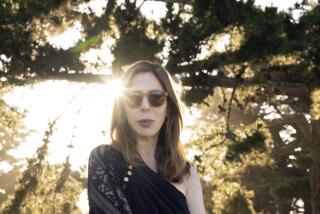‘On Moving’ by Louise DeSalvo; ‘The Winter Sun’ by Fanny Howe; ‘Salvation Army’ by Abdellah Taia.
The Winter Sun
Notes on a Vocation
Fanny Howe
Graywolf Press: 210 pp., $15 paper
“The formation of our relationship to the world (for some of us) is experienced as an unfolding.” This is how poet and essayist Fanny Howe has always written about the world and her memories of growing up in Boston, where her father was a law professor at Harvard and her mother helped found the Poets’ Theatre.
Howe was born in 1940. Her father fought in World War II, leaving her Irish mother to care for Fanny and her sister, Susan. Howe’s memoirs reveal a sharpening of focus -- it does seem that she lived much of her life with a dreamy sense of time and physical reality. Events such as the FBI’s invasion of her family’s home during the McCarthy hearings have less weight than her recurring dream of an imaginary home in Harlem, dreams that hint at a parallel existence. Writing has been a crucial part of Howe’s unfolding sense not only of self but of a self in the world. “It is only in the act of working on something, be it manual or mental labor, that you are aware of being at least half at the mercy of a will that is not personal, is not your own.”
One is grateful, in these times of harsh bottom lines, for meditative books like these, full of wondering, noticing and empathetic efforts to weave connections between events and individuals and the cultures they inhabit.
On Moving
A Writer’s Meditation on New Houses, Old Haunts, and Finding Home Again
Louise DeSalvo
Bloomsbury: 228 pp., $22
“The typical American moves 11.7 times in a lifetime,” writes Louise DeSalvo, scholar, observer and author of the revolutionary biography of Virginia Woolf that exposed (against a chorus of pooh-poohing from Woolf’s family) the impact of sexual abuse in Woolf’s childhood on her life and work.
On average, homeowners move every five to seven years. It is a time of great stress (financial and emotional), rich with potential and riddled with upheaval. “The effects of moving are experienced in the body, in the imagination, in the realm of desire. What the eye sees, what the body feels, what the heart yearns for, what remains and what has been lost -- these are difficult at first to describe.” DeSalvo is surprised to find how deeply writers are affected by moving and by how much their journals are taken up with imagining dream houses.
For Mark Doty, moving from Vermont to Provincetown, Mass., with his partner, Wally, after Wally was diagnosed as HIV-positive was a return to his roots, but also a move to a place that “was congenial to a gay man living with HIV and his partner.” In Vermont, they would have felt isolated. For Henry Miller, moving to Paris offered a clean slate, a fresh eye. Woolf and D.H. Lawrence both loved to move: “Lawrence believed human beings were not stagnant by nature but infinitely capable of change.”
Percy Bysshe Shelley’s belief that moving would assure his fame consumed him and his family’s resources. After a particularly nomadic childhood, Eugene O’Neill “never felt at home anywhere” and moved from place to place. DeSalvo writes of moving in 2003 for the first time in 30 years, and about how talking with her father in the months before he died about his experience of moving brought them closer. The creative people DeSalvo writes about “elevated the act of moving in their lives from the merely humdrum to one of the most significant acts they -- or any human being -- would undertake. Their reflections attest to the fact that where we live matters deeply, that where we move can enrich our lives,” while forced or ill-considered moves can be “tragic.”
Salvation Army
A Novel
Abdellah Taia, translated from
the French by Frank Stock
Semiotext(e): 152 pp., $14.95 paper
Abdellah Taia is hailed as the first North African Arab (more specifically, the first Moroccan) to write openly about his own homosexuality, in a place where homosexuality is still considered a crime. This autobiographical novel is the guilt-ridden story of a young man who finds some solace and glimmers of sexual freedom. Taia tells the story of his own childhood in Sale, his move in adolescence to Tangier, where he struggled with his deep attraction to his older brother and his efforts to overcome his fears of the Western world so that he could study in Geneva. There are beautiful details: mint tea, the family sorcerer, Egyptian ballads. But all these jewels crumble under the stifling weight of this young man’s fear -- of himself, of the adults around him and of what he will become if he accepts money for sex.
More to Read
The biggest entertainment stories
Get our big stories about Hollywood, film, television, music, arts, culture and more right in your inbox as soon as they publish.
You may occasionally receive promotional content from the Los Angeles Times.










